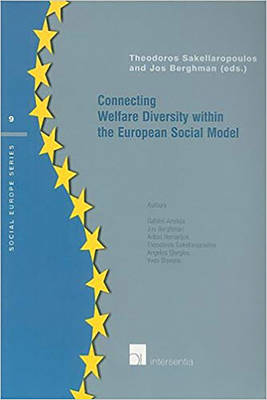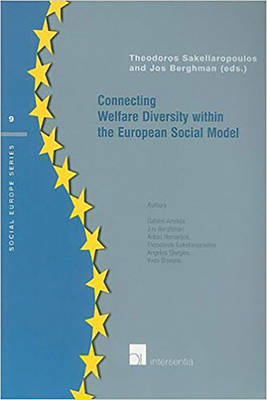
- Afhalen na 1 uur in een winkel met voorraad
- Gratis thuislevering in België vanaf € 30
- Ruim aanbod met 7 miljoen producten
- Afhalen na 1 uur in een winkel met voorraad
- Gratis thuislevering in België vanaf € 30
- Ruim aanbod met 7 miljoen producten
Zoeken
Connecting Welfare Diversity Within the European Social Model
Theodoros Sakellaropoulos, Jos Berghman
€ 67,00
+ 134 punten
Omschrijving
This volume is the revised Report, which an international team of experts have prepared for the Greek Ministry of Labour and Social Security in the context of the Greek Presidency of the European Union and presented in the international conference "The Modernisation of the European Social Model. EU Policies and Practices" on 24-25 May 2003, at Ioannina, Greece.
The book focuses on the Open Method of Coordination (OMC), its relation to other policy tools used in the European Social Policy and its significance for the fomation of a new European Social Model. The chapters follow the emergence, the evolution and analyze the constituent elements of the OMC in the fields of Social Inclusion and Pensions since the Lisbon Summit.
During the Portuguese Presidency OMC encountered a cautious response. The OMC idea made substantial progress during the Belgian Presidency. In the Ioannina conference the OMC had full recognition as a tool for the implementation of European Social Policy. Everyone agreed that important social issues were dealt with more effectively through the OMC, especially when the latter is consolidated after the inclusion of the Charter of the fundamental Rights in the new European Treaty.
This progress is sufficiently reflected in the present volume, where it is concluded that through OMC the European Social Model gained a new momentum in terms of effectiveness and legitimacy.
The book focuses on the Open Method of Coordination (OMC), its relation to other policy tools used in the European Social Policy and its significance for the fomation of a new European Social Model. The chapters follow the emergence, the evolution and analyze the constituent elements of the OMC in the fields of Social Inclusion and Pensions since the Lisbon Summit.
During the Portuguese Presidency OMC encountered a cautious response. The OMC idea made substantial progress during the Belgian Presidency. In the Ioannina conference the OMC had full recognition as a tool for the implementation of European Social Policy. Everyone agreed that important social issues were dealt with more effectively through the OMC, especially when the latter is consolidated after the inclusion of the Charter of the fundamental Rights in the new European Treaty.
This progress is sufficiently reflected in the present volume, where it is concluded that through OMC the European Social Model gained a new momentum in terms of effectiveness and legitimacy.
Specificaties
Betrokkenen
- Auteur(s):
- Uitgeverij:
Inhoud
- Aantal bladzijden:
- 270
- Taal:
- Engels
- Reeks:
Eigenschappen
- Productcode (EAN):
- 9789050953696
- Verschijningsdatum:
- 4/03/2004
- Uitvoering:
- Paperback
- Gewicht:
- 500 g

Alleen bij Standaard Boekhandel
+ 134 punten op je klantenkaart van Standaard Boekhandel
Beoordelingen
We publiceren alleen reviews die voldoen aan de voorwaarden voor reviews. Bekijk onze voorwaarden voor reviews.







